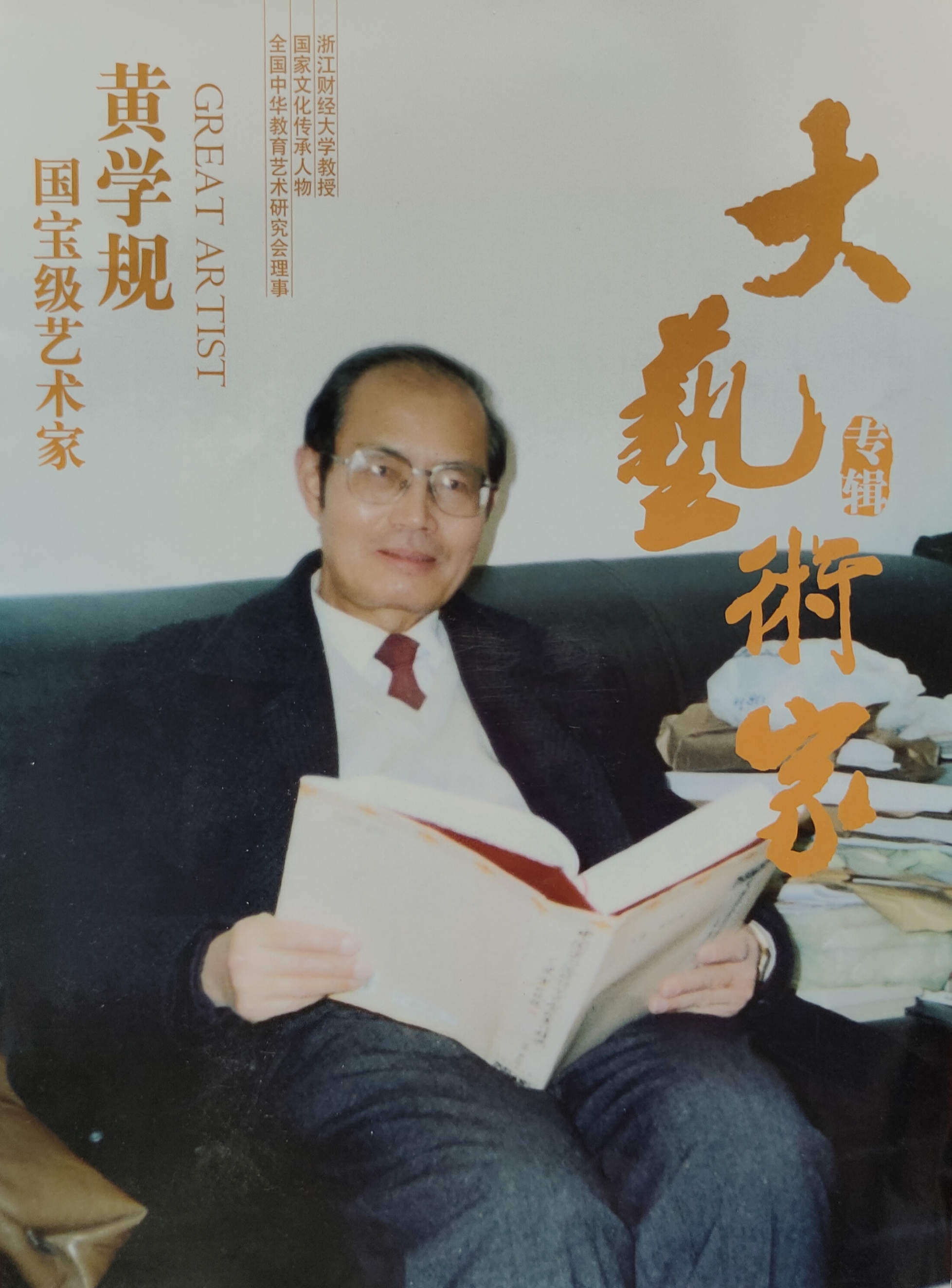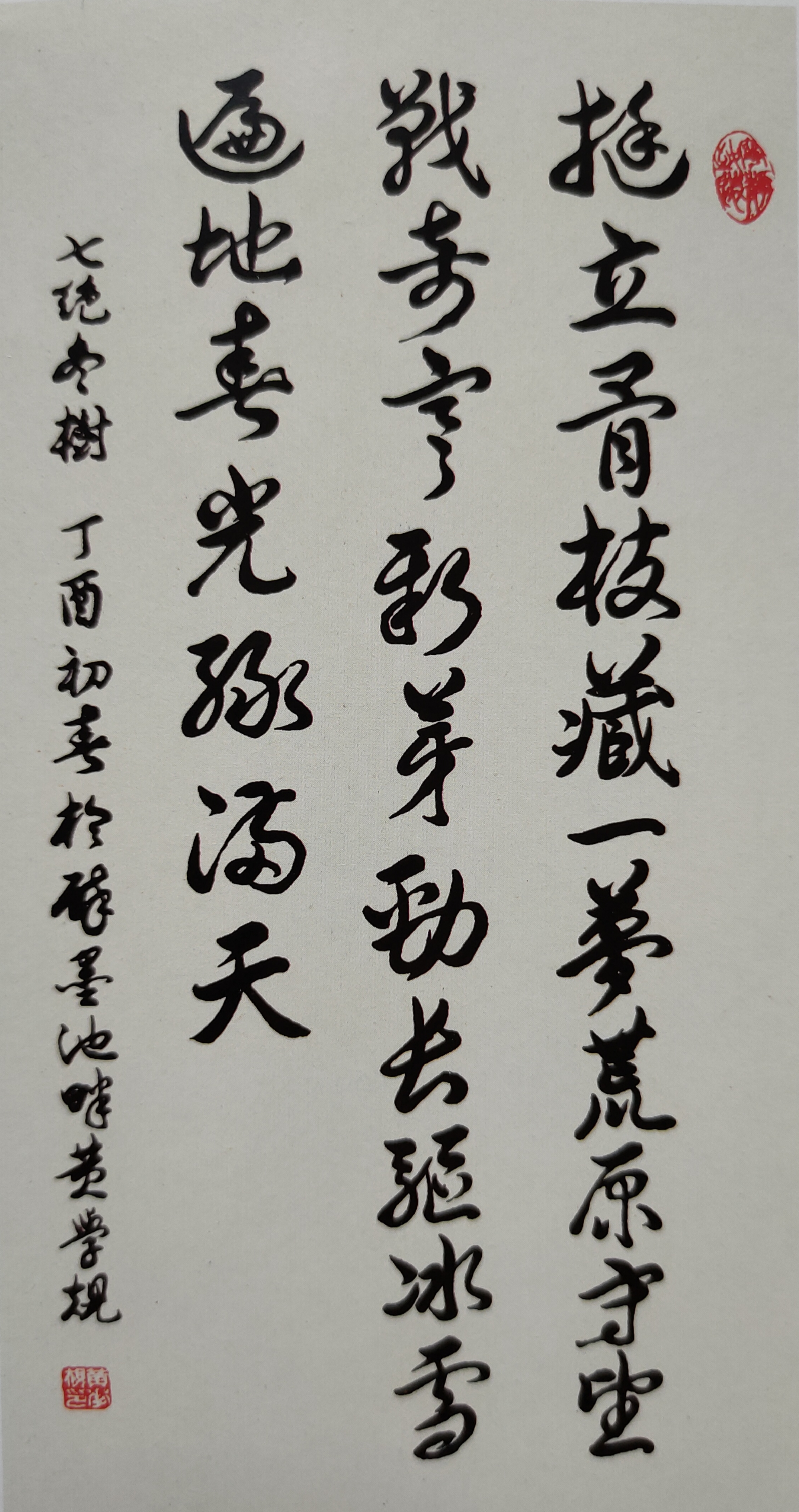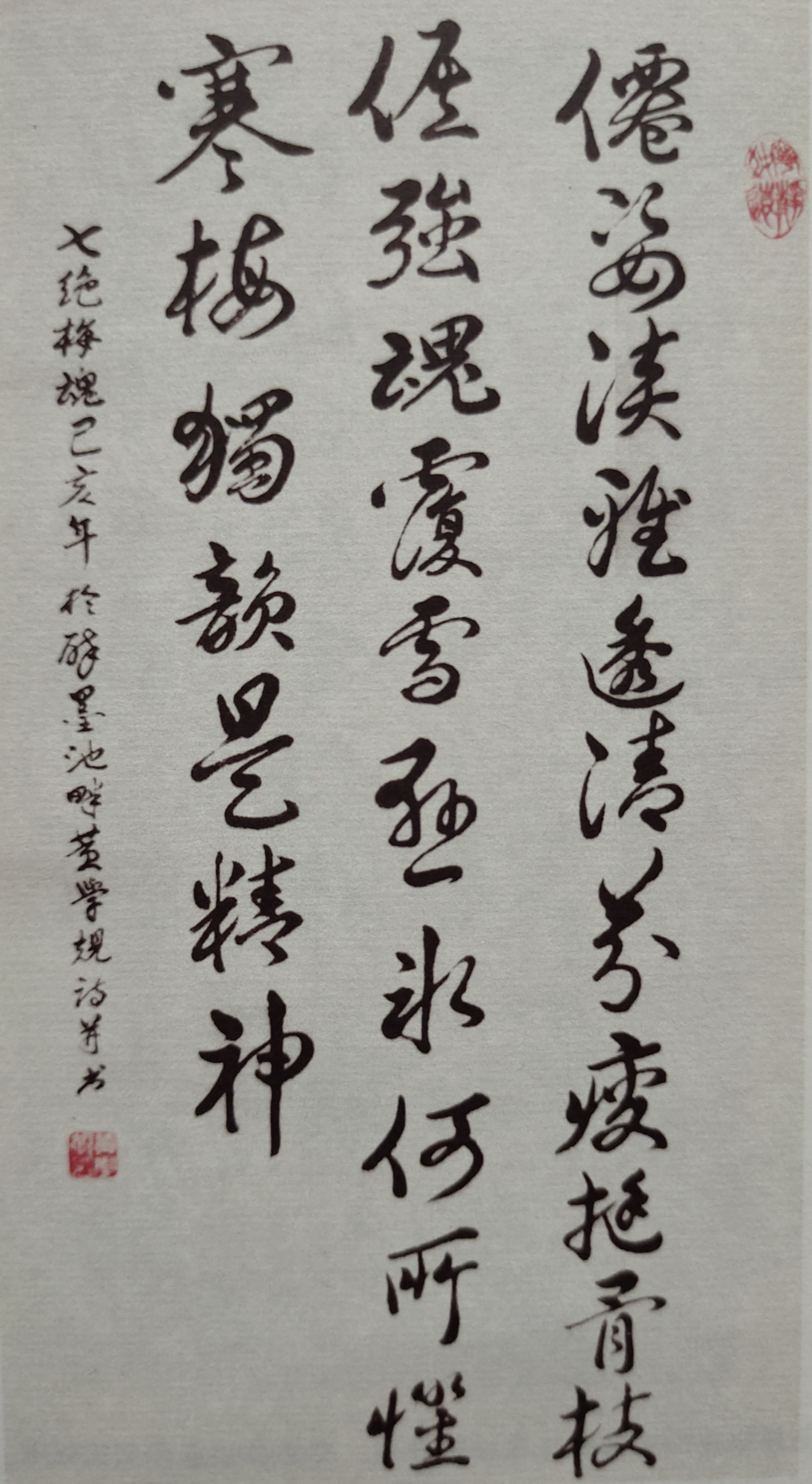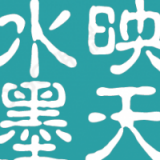“飘风忽举,鸷鸟乍飞” ——读黄学规教授书法
沈文华
Shen Wenhua
黄学规,浙江财经大学教授。近年,浙江大学出版社出版他的诗集《雨燕斋吟稿》第一卷(2017年)和第二卷(2021年)。著有学术专著(三部曲)《挫折与人生》、《人格与人生》、《审美与人生》和多种诗词专集,被诗界誉为“民族诗人”。据悉,不久将出版第三卷。
Huang Xuegui, a professor at Zhejiang University of Finance and Economics. In recent years, the first volume (2017) and second volume (2021) of his poetry collection "Yuyanzhai Yin Gao" have been published by Zhejiang University Press. He has also authored academic monographs ("Trilogy") such as "Frustration and Life", "Personality and Life", and "Aesthetics and Life", as well as various collections of poems and lyrics, earning him the title of "National Poet" in the poetry community. It is reported that the third volume will be published soon.

作者的二卷诗集,笔者曾写过两篇书评“甘守清心自在情”、“怀着自信从容而吟”,刊发在“中国国际新闻”等媒体并被作者收入诗集“序言”。对作者收入诗集的书法未曾评议,近日揣摩作者的书法,正如他给笔者的来信中所言,“生活于激情奋进的时代,书即心画,当为时代而歌。”
The author's second volume of poetry collection, I have written two book reviews "Gan Shou Qingxin Zizai Qing" and "Holding Confidence and Comfortably Reciting", which were published in the media such as "China International News" and were included in the preface of the author's poetry collection. I have not commented on the calligraphy included in the author's poetry collection. Recently, I pondered over the author's calligraphy, just as he said in his letter to me, "Living in an era of passionate progress, calligraphy is the reflection of one's heart, and it should sing for the times."
如,作者在“第一卷”中的代表作《七绝·冬树》(丁酉年),“挺立骨枝藏一梦,荒原守望战奇寒。新芽劲长驱冰雪,遍地春光绿满天。”作者是着重书法传统的,这可能与他“博诗文”有关联。这幅草书,较明显的师承,是“二王”中的潇洒流畅,晋代笔风跃然楮上。用笔上些许逸笔草草,更映带出书家游历秀丽山河的盎然情意。“墨有绿色”(明·张丑)读者在欣赏作者的书法艺术作品时,“书即心画”,一定会从黑色的字迹中,读出它背后迷人的色彩。作者退休后,偕夫人庄桂春游览祖国的大江南北和异域风光,伉俪情笃都融入了诗或书法艺术中,留下了人间美好的记忆。“遍地春光绿满天”,作者有意识的逸笔挥洒,率性自然在书法中有所显现,没有丝毫斧斫之痕。偶或透出的舒缓沉静以及用笔的回旋曲折,得了些米芾“风骨自然超逸”的神韵,又为书中平添了温润淳厚之趣。
For example, in the first volume of his poetry collection, the author's representative work "Seven Jue - Winter Tree" (Ding Younian), "Standing upright with a dream hidden in its bones, watching over the wilderness and fighting against the cold. The new buds grow strong and drive away the snow and ice, and the ground is covered with green spring light." The author focuses on calligraphy tradition, which may be related to his "expansive poetry and prose". This cursive script clearly inherits the elegance and fluency from the "Two Wangs", and the style of brushwork from the Jin Dynasty is vividly portrayed on the paper. With a few carefree strokes, it even reflects the calligrapher's vibrant feelings for traveling through beautiful mountains and rivers. "Ink has a green color" (Ming Dynasty, Zhang Chou). When readers appreciate the author's calligraphy works, they will definitely read the charming colors behind the black characters from "calligraphy is the reflection of one's heart". After retirement, the author traveled around China and foreign lands with his wife Zhuang Guichun, and their deep love was integrated into poetry or calligraphy art, leaving behind beautiful memories of life. "The ground is covered with green spring light", the author consciously wields his brush freely and naturally, without any trace of carving. Occasionally revealing a sense of relaxation and tranquility, as well as the twists and turns of the brushstrokes, he gains some of the charm of Mi Fu's "natural elegance and superiority", adding a warm and honest interest to the book.
《冬树》,作者悟出现实生活中富于哲理的“守望”,勾勒了人们对“冰雪”的无奈和对“新芽”的珍视,生动诉说了关于“冬树”,关于“春天”的情怀感念。作者在书写时,笔锋富有弹性,行笔婉墨,墨色用的也活,决无龙飞凤舞的习气,是自然清婉的胜出。
"Winter Tree", the author realizes the philosophical "watch" in real life, outlines people's helplessness towards "ice and snow" and cherishment towards "new buds", vividly tells about the feelings and thoughts of "winter tree" and "spring". When writing, the author's brushstrokes are elastic, the strokes are gentle and the ink color is also lively. There is no habit of flying dragons and dancing phoenixes, but a natural and elegant victory.

萧衍《古今书人优劣评》谓索靖书如“飘风忽举,鸷鸟乍飞”,索靖则自名其书为“银钩虿尾”。细赏作者的草书确有其风格也,这大概是作者常临《月仪帖》之缘吧。作者先后在浙江师范大学、杭州大学、浙江财经大学任教,是著名的格律诗诗人,诗词书法艺术家,中国民族文化研究会诗书艺术委员会终生名誉主席,中国艺术院院士。其诗词书法曾被选送到法国参加中国书法摄影国际展,美国哥伦比亚大学第二届纽约中国书法国际邀请展,曾入编《世界艺术百年传世名家》书画集,作品被瑞典现代艺术博物馆收藏,授得瑞典皇家艺术学院荣誉博士。
Xiao Yan's "Ancient and Modern Book People's Merits and Demerits Evaluation" describes Suo Jing's book as "like a gust of wind suddenly rising, and a fierce bird suddenly flying", while Suo Jing himself named his book "Silver Hook and Centipede Tail". Upon closer examination, the author's cursive writing does indeed have its own style, which is probably due to his frequent study of the "Moon Rituals" album. The author has taught at Zhejiang Normal University, Hangzhou University, and Zhejiang University of Finance and Economics, and is a well-known poet of regulated verse, as well as a calligrapher and artist. He is the lifelong honorary chairman of the Poetry and Calligraphy Art Committee of the Chinese National Culture Research Association and an academician of the Chinese Academy of Arts. His poetry, calligraphy, and art have been selected for the Chinese Calligraphy Photography International Exhibition in France, the Second New York Chinese Calligraphy International Invitation Exhibition at Columbia University in the United States, and have been included in the book "World Art Centennial Classics". His works are also collected by the Museum of Modern Art in Sweden, and he has been awarded an honorary doctorate by the Royal Academy of Arts in Sweden.
再如,作者在“第二卷”中的代表作《七绝·梅魂》(己亥年),“仙姿淡雅透清芬,瘦挺骨枝倔強魂。覆雪悬冰何所惧,寒梅独韵是精神。”此幅草书,其风格更加秀丽流便,是作者书法更为娴熟之代表作。人云“放手流便过索,而法则不如之。”和索靖同期(西晋)的卫瓘,其《顿首州民帖》便是。作者在诗中欣赏和称赞的是对梅花的高洁、坚强、谦虚、并催人奋进的品格,另一方面也表达了对于自己内心精神世界的追求。“瘦挺骨枝倔強魂”,作者同情弱者,心存敬畏,珍视友情,感恩亲情,笔墨丹青。“书道妙在性情,能在形质。”(清·包世臣)一笔一划融于书,心无旁骛,铭于志。再细品《梅魂》草书,其“银钩虿尾”的流韵,运笔如“姿”、“芬”、“瘦”、“枝”、“何”、“梅”等字,收笔更富于变化,笔势细微处亦不失于纤弱,而是行笔往左下取势,有着独有的审美意趣。
For example, in the "Second Volume" of the book, the author's representative work "Seven Quatrains: Plum Soul" (Ji Hai Year) reads, "Fairy-like elegance permeates the clear fragrance, thin and straight bones stubbornly hold the soul. Covered in snow and ice, what is there to fear, the cold plum alone has the spirit." This piece of cursive writing is even more beautiful and flowing, and is a representative work of the author's more skilled calligraphy. It is said that "letting go and being free like Suo Jing is not as good as following the rules." Wei Guan, who lived in the same period as Suo Jing during the Western Jin Dynasty, wrote "Dunshou Zhoumin Tie". In the poem, the author admires and praises the noble, strong, humble, and inspiring character of the plum blossom, while also expressing his pursuit of his own inner spiritual world. "Thin and straight bones stubbornly hold the soul", the author sympathizes with the weak, respects and cherishes friendship and gratitude for family, and expresses his thoughts through his brushstrokes. "The beauty of calligraphy lies in its temperament, which can be seen in its form." (Qing Dynasty, Bao Shichen) Every stroke is infused with the author's heart and soul, and engraved in his mind. Upon closer examination of the cursive writing in "Plum Soul", the flowing rhythm of "Silver Hook and Centipede Tail" is evident, with strokes that convey the elegance, fragrance, thinness, branches, snow, and plum blossom. The ending strokes are also rich in variation, and even the delicate strokes do not lose their fragility. The author's brushstrokes move towards the lower left, creating a unique aesthetic interest.

赏析作者的书法册页,其草书已游刃有余,笔断意连,顾盼呼应,气韵贯通。笔势清润优美,闲逸灵秀,“实而不拙,文而不浮。”朱熹尝评《十七帖》云:“十七帖玩其笔意,从容衍裕,而气象超然,不与法缚,不求法脱。真所谓——从自己胸襟流出者。”
Upon examining the author's calligraphy, it is evident that he is skilled in cursive writing, with strokes that flow smoothly and ideas that are connected. His brushstrokes are clear and elegant, with a relaxed and refined style that is "real but not clumsy, and literary but not pretentious." Zhu Xi once commented on the "Seventeen Album" saying, "The Seventeen Album plays with the meaning of the brush, with a calm and generous spirit that transcends the rules, neither bound by them nor seeking to break them. It is truly what is called 'flowing from one's own heart'."
作家出版社已丑年出版的《中华诗词史鉴》收录了作者诗词30首,该书汇集了从先秦至当代二千多年来中国诗坛的精品力作。历年来,作者还荣获“李白杯成就一代大家”、“杜甫杯诗圣奖金奖”、“中华诗词特殊贡献奖”、“爱国杰出诗人”、“铸魂金杯奖”等荣誉称号。
The "History of Chinese Poetry and Literature" published by the Writer's Publishing House in the Year of the Ox includes 30 poems by the author, bringing together the best works of Chinese poetry from more than two thousand years, from pre-Qin to contemporary times. Over the years, the author has also been awarded honorary titles such as "Li Bai Cup Achievement Award for Great Masters", "Du Fu Cup Poetry Saint Award", "Special Contribution Award for Chinese Poetry", "Outstanding Patriotic Poet", and "Soul Casting Gold Cup Award".
《燕雨斋吟稿》诗集,大部分诗词的主题是咏景、咏物和咏史,而作者挥墨所书的内容基本来自其诗集。苦心孤诣,历数十寒暑,独得之见。诗书同源,书中有诗;山川呼吸,天人相应;顺其脉络,发其幽微,作者慧心,阅者慧眼。
The collection of poems in "Yanyu Studio's Poetry Collection" mostly focuses on the themes of scenery, objects, and history, with the content of the author's calligraphy mostly coming from his poetry collection. After years of hard work and dedication, he has developed his own unique perspective. Poetry and calligraphy share the same source, with poetry in calligraphy; mountains and rivers breathe, and heaven and man correspond. By following its veins and exploring its subtleties, the author's insightful mind and the reader's discerning eye are brought together.
著名书法名家邵华泽题赠作者五言绝句“诗作务求精,难能立意新。凛然松柏气,更兼水云襟。”祝愿黄学规教授《雨燕斋吟稿》(第三卷)早日问世,诗音云水潺潺不息。
The famous calligrapher Shao Huaze inscribed a five-character quatrain for the author, saying "Poetry strives for excellence, but it is difficult to come up with new ideas. The spirit of pine and cypress is solemn, and it is accompanied by the water and clouds." He wishes that Professor Huang Xuegui's "Yanyu Studio's Poetry Collection" (Volume III) will be published soon, with the sound of poetry flowing like water.


0 条 评 论 Write a Response